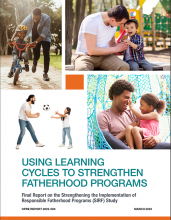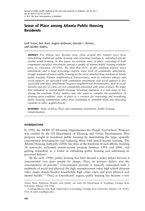Found 22 resources.
0
0
0

Federally funded Responsible Fatherhood programs work with fathers to promote healthy relationships and marriages, strengthen parenting practices, and help fathers attain economic stability. For programs to improve fathers’ outcomes, they need to be able to recruit fathers, engage them in services, and keep them actively participating in program activities. However, it is challenging for programs to achieve these participation goals. The Strengthening the Implementation of Responsible Fatherhood Programs (SIRF) study was designed to strengthen programs and build evidence on promising...
Topics: Family engagement, Healthy homes, Legislation & Policy, Low-income, Research, Stability
 Shared by Sandra Ware
on Jun 1, 2023
Shared by Sandra Ware
on Jun 1, 2023 0
0
0
The Vancouver Housing Authority collaborated with a Federally Qualified Health Center and a homeless crisis response system to develop a network of scattered-site and site-based supportive housing. This moderated discussion will cover how VHA paired Housing Choice Vouchers and public housing with a Medicaid-funded supportive housing benefit to serve people identified by the community’s Coordinated Entry as needing supportive housing. Speakers will also discuss the challenges faced through the process, model adjustments made, and evaluation of the work through matching housing data and...
Topics: Advocacy, CLPHA, Data sharing, Family engagement, Health, Healthy homes, Homelessness, Housing, Legislation & Policy, Low-income, Research, Stability, Sustainability
 Shared by Karina George
on Jun 17, 2022
Shared by Karina George
on Jun 17, 2022 0
0
0
CLPHA developed a general data sharing template that public housing authorities (PHAs) and their health partners can customize to suit their data sharing and collaboration needs. Please feel free to comment to share any uses/modifications your organization made to implement into a partnership.
Topics: Affordable Care Act, CLPHA, Community development, Cost effectiveness, Data sharing, Dental, Depression, Dual-eligibles, Funding, Health, Healthy homes, Legislation & Policy, Low-income, Medicaid / Medicare, Mental health, Metrics, MTW, Nutrition, Obesity, Partnerships, Place-based, Preventative care, Racial inequalities, Research, SAMHSA, Smoke-free, Stability, Substance abuse, Supportive housing, Sustainability, TA
 Shared by Steve Lucas
on Aug 5, 2019
Shared by Steve Lucas
on Aug 5, 2019 0
0
0
Housing is considered a social determinant of health, with poor housing conditions being associated with poor health. Veterans with disabilities are more likely to experience a housing crisis because of combat experiences and employment instability. We identified facilitators and barriers to finding and maintaining rental housing. We sought to understand the housing needs of Veterans with military-related disabilities using the biopsychoecological model (BEM) as an organizing framework.
Topics: Disabilities, Funding, Health, Homelessness, Housing, Legislation & Policy, Research, Safety, Seniors, Stability
 Shared by Housing Is
on Mar 14, 2019
Shared by Housing Is
on Mar 14, 2019 0
0
0

Disasters are becoming more common in America. In the early and mid-20th century, fewer than 20 percent of U.S. counties experienced a disaster each year. Today, it's about 50 percent. According to the 2018 National Climate Assessment, climate change is already driving more severe droughts, floods and wildfires in the U.S. And those disasters are expensive. The federal government spends billions of dollars annually helping communities rebuild and prevent future damage. But an NPR investigation has found that across the country, white Americans and those with more wealth often receive...
Topics: Community development, Funding, Housing, Legislation & Policy, Low-income, Racial inequalities, Research, Stability
0
0
0
Over the past two decades, criminal justice reform has focused on evidence-based interventions to prevent arrests and incarceration and to facilitate community reintegration. These initiatives represent a movement toward a less punitive, more holistic approach to public safety, targeting critical social factors that lead to and perpetuate criminal justice involvement. Because housing problems are often a key underlying factor for people’s involvement with the criminal justice system, there are ways housing interventions can help lessen criminal justice involvement. Decriminalizing...
Topics: Criminal justice, Homelessness, Housing, Legislation & Policy, Low-income, Research, Stability
0
0
0
U.S. House Committee on Financial Services, Full Committee
Topics: Funding, Homelessness, Housing, Legislation & Policy, Research, Stability
0
0
0
State and local governments are debating and adopting new landlord-tenant laws and pilot programs, such as expanded legal representation and just-cause eviction requirements. Yet, few housing experts understand evictions well enough to channel the demand for change into clarity about specific eviction problems and potential solutions. Now is the time for policymakers and advocates to get smart. Here are five strategies for policymakers to consider as they address America’s eviction crisis.
Topics: Housing, Legislation & Policy, Low-income, Research, Stability
0
0
0
In response to the heightened interest in the relationship between work and the health of individuals and communities, CMCS has clarified that Medicaid funds cannot be used to pay beneficiaries’ wages, but can pay for employment counseling as an optional benefit—to help people get jobs. Years of experience with work requirements for the Supplemental Nutrition Assistance Program, Aid to Families with Dependent Children, and populations with disabilities have developed the evidence for what is needed to help different populations find and keep jobs.
Topics: Affordable Care Act, Disabilities, Health, Legislation & Policy, Low-income, Medicaid / Medicare, Research, Stability, Workforce development
0
0
0
Stricter work requirement policies for the Supplemental Nutrition Assistance Program (SNAP) at the federal level were left out of the recently passed farm bill, but state policymakers are still considering whether to expand or establish their own work requirements for SNAP and Medicaid, with the goal of incentivizing employment. There’s no question that good jobs help spur upward mobility. But if we are serious about helping people work, we have to get serious about helping people improve their skills.
Topics: Child welfare, Cost effectiveness, Dual-generation, Early childhood, Food insecurity, Legislation & Policy, Low-income, Research, Stability, Workforce development
0
0
0
Health and reentry are closely related, and chronic medical, mental health, and substance use problems make it harder for newly released people to seek employment, obtain housing, and avoid reincarceration. Compared with the general population, justice-involved people tend to be in poorer health and need access to physical and behavioral health services, as well as the know-how and motivation to get care.
Topics: Affordable Care Act, Criminal justice, Health, Legislation & Policy, Low-income, Medicaid / Medicare, Research, Stability
0
0
0
Most states use an education funding formula to allocate state and local dollars to school districts. Most funding formulas attempt to account for student poverty, among other factors, in distributing funds. But there are several ways to count low-income students and even more ways to tie dollars to these student counts.
Topics: Child welfare, Education, Legislation & Policy, Low-income, Place-based, Research, Stability, Youth
0
0
0
The Enhanced Transitional Jobs Demonstration (ETJD), funded by the Employment and Training Administration of the U.S. Department of Labor, tested seven transitional jobs programs that targeted people recently released from prison or low-income parents who had fallen behind in child support payments.
Topics: Asset building, Cost effectiveness, Criminal justice, Legislation & Policy, Low-income, Research, Stability, Workforce development, Youth
0
0
0
The evidence on how homelessness affects children suggests policymakers should be doing everything possible to prevent homelessness and, when families who do lose their housing, to help them exit homelessness and stabilize in housing quickly. Rapid re-housing (RRH) can help homeless families in crisis.
Topics: Child welfare, Health, Homelessness, Housing, Legislation & Policy, Low-income, Research, Stability
0
0
0
Using multiple panels from the US Census Bureau’s Survey of Income and Program Participation, we find that participation in Temporary Assistance for Needy Families, the Supplemental Nutrition Assistance Program (SNAP), or public health insurance reduces the number of hardships low-income families with children experience by 48 percent and reduces the share who experience food insufficiency by 72 percent.
Topics: Child welfare, Cost effectiveness, Food insecurity, Legislation & Policy, Low-income, Medicaid / Medicare, Metrics, Research, Stability
0
0
0
Although the rental assistance programs varied, key themes emerged, including (1) most programs, recognizing the impact of housing stability on health outcomes, targeted populations served by state or local health and human services programs; (2) most programs served a growing number of households over time; (3) funding generally increased over time and most of it came from general revenue; and (4) programs involved collaboration between the housing and health and human services agencies to ensure clients’ needs were comprehensively met.
Topics: Funding, Health, Housing, Legislation & Policy, Low-income, Partnerships, Place-based, Research, Stability
0
0
0
For almost two decades now, cities around the country have been demolishing traditional public housing and relocating residents to subsidized private market rental housing. In this paper, we examine sense of place, consisting of both community and place attachment, among a sample of Atlanta public housing residents prior to relocation.
Topics: Asset building, Housing, Legislation & Policy, Low-income, Mental health, Mobility, Research, South, Stability
 Shared by Housing Is
on Aug 9, 2018
Shared by Housing Is
on Aug 9, 2018 0
0
0
Topics: Attendance, Child welfare, East Coast, Education, Grade-level proficiency, Homelessness, Housing, Legislation & Policy, Low-income, Metrics, Out-of-school time, Racial inequalities, Research, School-readiness, Stability, Youth
 Shared by Housing Is
on Jul 5, 2018
Shared by Housing Is
on Jul 5, 2018 0
0
0

It adds to the growing body of evidence that addressing homelessness saves money elsewhere.
Topics: Cost effectiveness, Criminal justice, Health, Healthy homes, Homelessness, Housing, Legislation & Policy, Place-based, Preventative care, Research, Stability, West Coast
 Shared by Housing Is
on Jul 5, 2018
Shared by Housing Is
on Jul 5, 2018 0
0
0
Topics: Community development, Cost effectiveness, Housing, Legislation & Policy, Low-income, Metrics, Partnerships, Place-based, Research, Stability, Workforce development
 Shared by Housing Is
on Jul 5, 2018
Shared by Housing Is
on Jul 5, 2018 0
0
0

Why do some neighborhoods appear able to launch effective local improvement initiatives, while others are more hampered by fragmentation and mistrust? Why can some communities mobilize diverse constituencies to influence public policy, while others cannot? Answers to these questions may be found in the specific patterns of collaboration that form among community organizations, and between these groups, schools, public agencies, and elected officials, according to MDRC, a preeminent social-policy research organization.
Topics: Asset building, Child welfare, Community development, Data sharing, Dual-generation, Education, Family engagement, Funding, Health, Housing, Legislation & Policy, Low-income, Metrics, Midwest, Mobility, Out-of-school time, Partnerships, Place-based, Preventative care, Research, Safety, Stability, Workforce development, Youth
0
1
1
The Council of Large Public Housing Authorities (CLPHA) hosted The Housing Is Summit in Washington, D.C., on May 3-4, 2018 with 300 partners across the housing, education, and healthcare sectors. Access video recordings of the Summit's keynote speakers (HUD Secretary Ben Carson, John Bridgeland, Matthew Morton), plenary panels (on topics that cut across sectors like anchor institutions, data collaboration, stability, and foundation investments), and select breakout sessions focused on the intersections of housing, education, and health.
Topics: Affordable Care Act, Attendance, Child welfare, CLPHA, Community development, Data sharing, Dual-eligibles, Dual-generation, Early childhood, Education, Funding, Grade-level proficiency, Health, Healthy homes, Homelessness, Housing, Legislation & Policy, Low-income, Medicaid / Medicare, Mental health, Metrics, MTW, Out-of-school time, Partnerships, Place-based, Preventative care, Racial inequalities, Research, School-readiness, Seniors, Stability, Substance abuse, Supportive housing, Sustainability, TA, Workforce development, Youth
 Shared by Steve Lucas
on May 23, 2018
Shared by Steve Lucas
on May 23, 2018 
